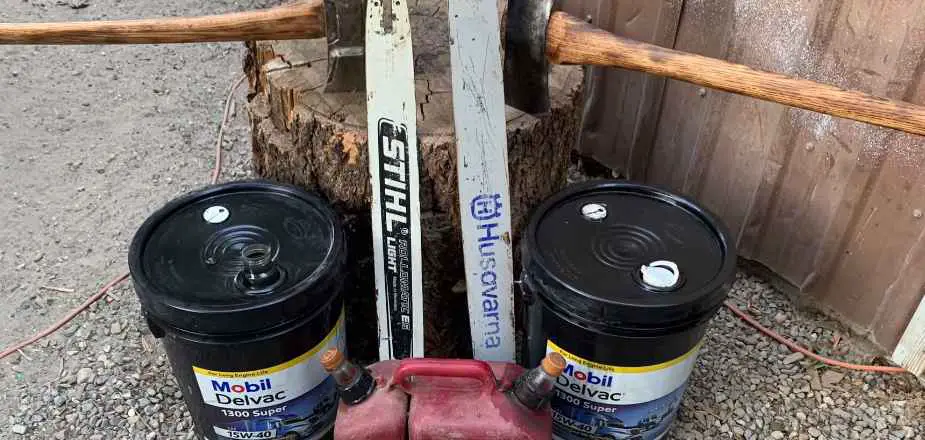No, you should not use used motor oil for chainsaw bar oil. It is not recommended due to potential adverse effects on the chainsaw’s performance and overall operation.
Using the correct oil for your chainsaw bar is crucial for maintaining its performance and durability. While it may be tempting to reuse old motor oil, it is not advisable to do so. This is because used motor oil can contain contaminants, debris, and moisture that can adversely affect the chainsaw’s performance and potentially damage its internal components.
In order to ensure optimal lubrication and proper functioning of your chainsaw, it is best to use specially formulated chainsaw bar oil. We will explore the reasons why using used motor oil for chainsaw bar oil is not recommended and provide alternative options for effective lubrication.

The Importance Of Chainsaw Bar Oil
Lubrication For Chainsaw Operations
Using the proper lubricant for your chainsaw is crucial for its optimal performance and longevity. The chainsaw bar oil plays a vital role in keeping your chainsaw running smoothly and efficiently. In this section, we will explore the importance of chainsaw bar oil and why using used motor oil may not be the best option.
Reduces Friction And Wear On The Bar And Chain
Proper lubrication is essential to reduce friction and wear on the bar and chain of your chainsaw. Here’s why using chainsaw bar oil is beneficial:
- Chainsaw bar oil is specifically formulated to have the right viscosity, allowing it to flow easily and evenly along the bar and chain. This ensures smooth operation and minimizes friction, reducing wear on these crucial components.
- Unlike motor oil, chainsaw bar oil is designed to cling to the bar and chain, forming a protective layer that prevents metal-to-metal contact. This protective layer not only reduces friction but also prevents rust and corrosion, extending the lifespan of your chainsaw.
Ensures Optimal Performance And Longevity Of The Chainsaw
Using the appropriate bar oil for your chainsaw is essential for its overall performance and longevity. Here’s why:
- Chainsaw bar oil has additives that help to reduce heat buildup during operation. Excessive heat can damage the bar and chain, affecting their performance and durability. The specialized formulation of bar oil helps dissipate heat effectively, ensuring your chainsaw operates efficiently.
- Chainsaw bar oil is designed to withstand high loads and pressures that chainsaws often encounter during cutting. It provides the necessary lubrication to withstand these demanding conditions, ensuring smooth cutting and preventing premature wear or damage to the bar and chain.
Using the right chainsaw bar oil is crucial for maintaining the optimal performance and longevity of your chainsaw. It reduces friction, wear, and heat buildup while providing the necessary lubrication for smooth operation.
Remember to always use chainsaw bar oil specifically formulated for chainsaws, rather than opting for used motor oil, to ensure the best results for your chainsaw’s maintenance and performance.
Understanding Chainsaw Bar Oil Composition
Chainsaw bar oil plays a crucial role in lubricating the bar and chain of a chainsaw, ensuring smooth operation and preventing premature wear. However, have you ever wondered if you could use used motor oil as a substitute for chainsaw bar oil?
Let’s take a closer look at the composition of chainsaw bar oil and how it differs from used motor oil.

Main Components Of Chainsaw Bar Oil
Chainsaw bar oil is specifically designed to meet the requirements of chainsaws, providing optimal lubrication for the chain and bar. The key components of chainsaw bar oil include:
- Base oil: Chainsaw bar oil typically consists of a high-viscosity petroleum-based base oil. This base oil acts as the primary lubricating agent, reducing friction and preventing heat buildup during operation.
- Additives: Chainsaw bar oil may also contain additives such as tackifier, anti-wear agents, and corrosion inhibitors. These additives enhance the performance and longevity of the lubricant, ensuring proper protection to the chainsaw components.
Viscosity Requirements For Proper Lubrication
Lubricating a chainsaw bar requires a specific level of viscosity to ensure proper lubrication. Viscosity refers to the oil’s thickness or resistance to flow. Chainsaw bar oil is formulated with a higher viscosity compared to used motor oil due to the unique demands of chainsaw operation.
- High viscosity: Chainsaw bar oil has a high viscosity, which allows it to adhere to the chain and bar effectively. This thickness ensures that the oil stays in place during high-speed cutting and reduces wear and tear.
- Temperature stability: Chainsaw bar oil is designed to maintain its viscosity even under extreme temperature conditions. This stability ensures consistent lubrication, whether in scorching heat or freezing cold.
Comparison Of Used Motor Oil To Chainsaw Bar Oil
While it may be tempting to repurpose used motor oil as chainsaw bar oil, it should be avoided. Here’s why:
- Contaminants: Used motor oil may contain contaminants such as metal shavings, dirt, and debris. These contaminants can clog the chainsaw’s oiling system, leading to decreased performance and potential damage.
- Inadequate lubrication: Used motor oil may not meet the specific viscosity requirements for chainsaw bar lubrication. Its lower viscosity can result in insufficient lubrication, leading to increased friction and wear on the chainsaw components.
- Environmental concerns: Proper disposal of used motor oil is crucial to prevent environmental pollution. Pouring used motor oil onto the ground or into waterways can have detrimental effects on ecosystems. It’s important to adhere to proper recycling and disposal methods for used motor oil.
Using used motor oil as chainsaw bar oil is not recommended due to differences in composition, viscosity requirements, and potential contaminants. To ensure optimal performance and longevity of your chainsaw, it’s best to use chainsaw bar oil specifically formulated for the task at hand.
Potential Risks And Issues With Using Used Motor Oil
Using used motor oil as a substitute for chainsaw bar oil may seem convenient and cost-effective. However, there are several potential risks and issues associated with this practice. It is important to consider these factors before deciding whether to use used motor oil in your chainsaw.
In this section, we will explore the contaminants and impurities in used motor oil, the impact on chainsaw performance and longevity, as well as environmental concerns and regulations.
Contaminants And Impurities In Used Motor Oil
- Used motor oil can contain a variety of contaminants and impurities, such as metals, dirt, and sludge. These substances can clog the oil delivery system in your chainsaw, leading to inadequate lubrication and potentially causing damage to the bar and chain.
- The presence of contaminants in used motor oil can also cause excessive wear on the chainsaw’s components, reducing its overall performance and lifespan.
- Furthermore, using used motor oil with high levels of impurities can increase the risk of engine failure and other mechanical issues.
Impact On Chainsaw Performance And Longevity
- Chainsaws require specific bar oil to ensure proper lubrication and cooling of the chain and bar during operation. Using used motor oil that doesn’t meet the requirements of a chainsaw can compromise its performance and longevity.
- The viscosity of used motor oil may not be suitable for a chainsaw, leading to inadequate lubrication and increased friction. This can result in overheating, premature wear, and a decrease in cutting efficiency.
- Chainsaws rely on a consistent supply of clean bar oil to prevent premature chain wear, decrease friction, and maintain optimal cutting performance. Using contaminated used motor oil can disrupt these crucial functions.
Environmental Concerns And Regulations

- It is important to consider the environmental impact of using used motor oil as bar oil for chainsaws. Used motor oil contains harmful substances such as heavy metals, additives, and other contaminants that can contaminate the soil and water if not properly disposed of.
- Improper disposal of used motor oil is a violation of environmental regulations in many regions. It is essential to follow proper disposal procedures, such as taking used motor oil to a recycling center or a facility that can handle hazardous waste.
- In addition to environmental concerns, using used motor oil may also violate manufacturer recommendations for chainsaws. Manufacturers typically recommend specific types and grades of bar oil to ensure optimum performance and to maintain the warranty of the chainsaw.
While using used motor oil as bar oil for your chainsaw may seem like a convenient solution, it poses potential risks and issues. The contaminants and impurities present in used motor oil, along with their negative impact on chainsaw performance and lifespan, should be carefully considered.
Additionally, the environmental concerns associated with improper disposal of used motor oil and the potential violation of manufacturer recommendations should not be overlooked. It is best to use specialized bar oil designed for chainsaws to ensure optimal performance, longevity, and adherence to environmental regulations.
Alternatives To Used Motor Oil For Chainsaw Bar Oil

When it comes to using chainsaws, it’s vital to ensure that the chainsaw bar is adequately lubricated to minimize friction and prevent premature wear. While some people might consider using used motor oil as a budget-friendly option for chainsaw bar oil, it’s not recommended due to several reasons.
However, there are alternatives to used motor oil that you can consider using for your chainsaw bar oil needs. Let’s explore some of these alternatives below:
Recommended Oils For Chainsaw Operation
- Chainsaw bar oil: The best and most recommended oil for chainsaw bar lubrication is chainsaw bar oil, specifically designed to provide high-performance lubrication. It has unique properties that help reduce wear and enhance the lifespan of the chainsaw bar. Chainsaw bar oil is available in various viscosity to suit different operating conditions.
- Vegetable oils: Vegetable oils, such as canola or vegetable-based bar and chain oils, can be a sustainable alternative to traditional chainsaw bar oil. These oils are biodegradable and easily available. However, it’s essential to consider their viscosity and ability to withstand high temperatures before using them as substitutes.
- Bio-oils: Bio-oils are environmentally friendly alternatives to conventional chainsaw bar oils. These oils are typically made from renewable resources and have excellent lubrication properties. They are biodegradable and help reduce the impact on the environment. However, like vegetable oils, it’s crucial to ensure that the bio-oil you choose can withstand the high operating temperatures of chainsaws.
Synthetic Oils Vs. Conventional Oils
- Synthetic oils: Synthetic oils are formulated with advanced additives to provide exceptional lubrication and performance even under extreme conditions. These oils offer improved protection against wear, reduce friction, and enhance the lifespan of the chainsaw bar. They also tend to have a more consistent viscosity, ensuring consistent lubrication throughout the chainsaw operation.
- Conventional oils: Conventional oils, also known as mineral oils, are less expensive compared to synthetic oils. While they may lack some of the performance advantages of synthetic oils, they still provide suitable lubrication for chainsaw bars. However, it’s essential to change conventional oils more frequently due to their lower ability to resist high temperatures and prolonged use.
Benefits And Drawbacks Of Different Chainsaw Bar Oil Options
**chainsaw bar oil:**
- Benefits:
- Provides excellent lubrication and protection against wear.
- Designed specifically for chainsaw bar applications.
- Extends the lifespan of the chainsaw bar.
- Reduces the risk of overheating and damage.
- Drawbacks:
- Can be more expensive than alternative options.
- Not as readily available as used motor oil.
**vegetable oils:**
- Benefits:
- Environmentally friendly and biodegradable.
- Can provide adequate lubrication in certain conditions.
- Easily accessible and affordable.
- Drawbacks:
- Viscosity may vary, impacting lubrication effectiveness.
- May not perform well under high operating temperatures.
- Some vegetable oils may spoil or turn rancid over time.
**bio-oils:**
- Benefits:
- Environmentally friendly and biodegradable.
- Provides effective lubrication for chainsaw bars.
- Can be made from renewable resources.
- Drawbacks:
- Performance can vary depending on the specific bio-oil used.
- May not withstand high temperatures effectively.
- Availability may be limited compared to conventional oils.
Remember, regardless of the alternative option you choose for chainsaw bar oil, following the manufacturer’s recommendations and guidelines for lubrication is crucial. Proper lubrication will help ensure your chainsaw operates at its best and extends the overall lifespan of the chainsaw bar.
Proper Maintenance And Care For Chainsaw Bar And Chain

Importance Of Regular Cleaning And Maintenance
Proper maintenance and care for your chainsaw bar and chain are essential to keep them in optimal condition and ensure their longevity. Regular cleaning and maintenance not only improve the performance of your chainsaw but also help prevent accidents and costly repairs.
Here are the key points to consider:
- Remove debris: After each use, make sure to remove any debris, such as wood chips and sawdust, from your chainsaw bar and chain. This prevents buildup that can affect the chain’s movement and cause it to bind or become less efficient.
- Inspect for damage: Regularly inspect your chainsaw bar and chain for any signs of wear, such as chips, dents, or cracks. Damaged components can compromise the performance and safety of your chainsaw and should be replaced immediately.
- Clean the bar groove: The bar groove is a critical component that guides the chain and needs to be kept clean and free of debris. Use a bar groove cleaner or a small screwdriver to remove any dirt or sawdust buildup.
- Check the chain tension: Proper chain tension is important for safety and performance. Check the tension regularly, and adjust it as needed to ensure it is neither too loose nor too tight.
- Lubricate the bar and chain regularly: Proper lubrication is crucial to reduce friction and heat generated during cutting. Use the appropriate chainsaw bar oil and apply it regularly to the bar and chain to ensure smooth operation and prevent premature wear.
Choosing The Right Chainsaw Bar Oil For Your Needs
Using the right chainsaw bar oil is essential for optimal performance and protection of your chainsaw bar and chain. Consider the following factors when selecting the appropriate bar oil.
- Viscosity: Choose a chainsaw bar oil with the correct viscosity to match the prevailing weather conditions. Thicker oil is recommended for colder temperatures, while lighter oil works well in warmer climates.
- Adhesive properties: Look for bar oil that has good adhesive properties to ensure it stays on the bar and chain, even during high-speed cutting. This helps reduce wear and prevent the chain from drying out.
- Anti-wear additives: Opt for bar oil that contains anti-wear additives to provide additional protection against friction, heat, and corrosion. These additives enhance the lifespan of your chainsaw bar and chain.
- Environmentally friendly options: Consider using environmentally friendly bar oils that are biodegradable and minimize harm to the ecosystem if spilled or leaked.
Tips For Extending The Lifespan Of Your Chainsaw Bar And Chain
Proper maintenance alone is not sufficient to maximize the lifespan of your chainsaw bar and chain. Implementing the following tips will help extend their longevity:
- Sharpen the chain regularly: A sharp chain is more efficient and reduces strain on the chainsaw motor. Use a proper chainsaw file or have the chain sharpened professionally to maintain its cutting effectiveness.
- Rotate the bar regularly: Rotating the bar can distribute wear more evenly and extend its lifespan. Be sure to regularly inspect and clean the bar mounts to prevent the buildup of dirt and sawdust.
- Avoid chainsaw bar contact with the ground: Direct contact with the ground can damage the bar and chain. Be mindful of your cutting techniques and avoid letting the chainsaw bar touch the ground during operation.
- Proper storage: When not in use, store your chainsaw in a dry and protected area to prevent rust or damage. Consider using a chainsaw case or cover to shield it from dust and moisture.
- Follow manufacturer guidelines: Always adhere to the manufacturer’s instructions for maintenance, lubrication, and tensioning of your chainsaw bar and chain. This ensures proper care and optimal performance.
Regular cleaning and maintenance, along with the appropriate chainsaw bar oil and adherence to manufacturer guidelines, are vital for the longevity and performance of your chainsaw bar and chain. Implement these tips for a well-maintained chainsaw that consistently delivers excellent results.
Frequently Asked Questions Of Can I Use Used Motor Oil For Chainsaw Bar Oil
Can I Use Used Motor Oil For Chainsaw Bar Oil?
No, it is not recommended to use used motor oil for chainsaw bar oil. Used motor oil can contain contaminants that can damage the chainsaw’s bar and chain. It is best to use bar and chain oil specifically designed for chainsaws, as it provides better lubrication and protection for your chainsaw.
Conclusion
Opting to use used motor oil for chainsaw bar oil may seem like a cost-saving measure, but it comes with potential risks. It may not provide adequate lubrication to the chainsaw bar, leading to increased friction and wear. This can result in reduced performance and shortened lifespan of the chainsaw.
Additionally, used motor oil contains contaminants and impurities that could harm the environment when disposed of improperly. It is recommended to use a proper chainsaw bar oil that is specifically designed for lubricating chainsaw bars. These oils are formulated to provide optimal lubrication, reduce friction, and protect against wear.
By using the correct chainsaw bar oil, the chainsaw can operate efficiently and last longer. Furthermore, it helps to contribute to environmental sustainability by using and disposing of the appropriate oil. Remember to always follow the manufacturer’s recommendations for chainsaw maintenance and care to ensure optimal performance and durability.
By doing so, you can confidently and responsibly use your chainsaw for your various cutting needs.